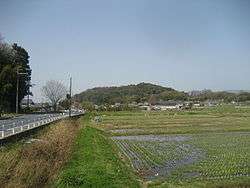Kunimi (practice)
The ancient Japanese practice of kunimi (国見), lit. "viewing the realm", involved climbing a mountain to survey the land, often before praising it in song. It is documented in the early chronicles the Kojiki and Nihon Shoki as well as in a number of poems in the Man'yōshū.[1]

Origins
Close association with the Imperial House may suggest that kunimi was an agricultural rite imported from China; alternatively it may have been a folk practice.[1] The "blood relationship" between emperor and land gives kunimi added significance.[2]
The earliest documented occurrence was in 663 BC, when Emperor Jimmu ascended a mountain in Uda and spotted 80 bandits on Kunimi Hill. He is advised by the kami to subdue them by gathering clay from Mount Kagu and creating from it sacred vessels for propitiatory sacrifice accompanied by incantation.[1] In 630 Jimmu himself ascended the hill of Wakigami no Hohoma no Oka, viewed the land, and observed:
"Oh! what a beautiful country we have become possessed of! Though a blessed land of inner-tree-fibre, yet it resembles a dragonfly licking its hinder parts".[1]
The imperial excursions of Emperor Ōjin and Emperor Yūryaku also led to kunimi.[1]
Man'yōshū
There are a number of kunimi uta or land-viewing poems in the Man'yōshū, including MYS 1: 2 by Emperor Jomei:[1][3]
Countless are the mountains in Yamato,
But perfect is the heavenly hill of Kagu;
When I climb it and survey my realm,
Over the wide plain the smoke-wreaths rise and rise,
Over the wide lake the gulls are on the wing;
A beautiful land it is, the Land of Yamato!
See also
- Yamato Sanzan
- Ascent of Mount Ventoux
References
- Ebersole, Gary L. (1989). Ritual Poetry and the Politics of Death in Early Japan. Princeton University Press. pp. 23–30. ISBN 978-0-6910-1929-1.
- Keene, Donald (1988). The Pleasures of Japanese Literature. Columbia University Press. p. 57. ISBN 0-231-06736-4.
- Nippon Gakujutsu Shinkōkai, ed. (1940). The Manyoshu: One Thousand Poems Selected and Translated from the Japanese. Iwanami Shoten.